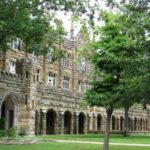Extracurriculars for the Prospective BS/MD Student
Are you a top high school student who is intent on pursuing a career in medicine? Are you focused on your goals and driven to do whatever is necessary to achieve them? If you answered yes to these questions, you should consider applying to a combined BS/MD program to streamline the process of attaining a medical degree.
Combined BS/MD programs allow you to complete a Bachelor’s of Science (BS) degree and then proceed directly into a medical program for your Doctor of Medicine (MD) degree. Basically, you apply for and are accepted to your undergraduate program and med school at the same time. It’s an intensive process, and it isn’t easy.
In fact, BS/MD programs are the among the most competitive programs in the country. While acceptance rates to Harvard hover around 5%, acceptance rates to BS/MD programs are even lower, at around 4%.
In order to get accepted, not only do you need to be among the top students in your class with a near-perfect GPA and test scores to match, but also you need to be the pinnacle of extracurricular success.
Think of it this way—nearly everyone applying will have close to the same top-notch test scores and grades. Extracurriculars are one of just a few remaining factors that can set you apart from the rest of the applicant pool.
So what should you do to ensure that you’re putting your best foot forward? Read on to learn about the extracurricular activities we recommend you pursue if your goal is to gain acceptance to a BS/MD program.
What Is the Goal of Extracurriculars For Prospective BS/MD Students?
If you want to shine in the already competitive field of BS/MD applicants, you’ll need to truly emphasize your devotion to science and the field of medicine, and your passion for helping others.
While it’s easy to rest on your laurels and assume that your work in science classes has already proven your ability to excel in the field of medicine, don’t let your grades and test scores do all the talking. Back it up with hands-on experiences that show the initiative to take your learning to the next level.
What Specific Extracurriculars Should BS/MD Students Pursue?
Keeping in mind that the goal of your extracurriculars should be to show dedication and skills in related fields as well as your commitment to helping others, there are specific extracurriculars that you should consider as a BS/MD hopeful:
Volunteer/Service Work
There’s no better way to exemplify your willingness to help others than by volunteering your time, energy, and services to do so. Obviously it is ideal if you can volunteer in a field that is somehow related to medicine, but it’s not entirely necessary either.
Many volunteer opportunities in the medical field will have strict age requirements that exclude you from working with patients directly. However, you might be able to help with delivering meals, changing linens, or even spending time with lonely patients. Simply being in a medical environment will allow you to learn a lot about what goes on behind the scenes and will broaden your vision of a career in medicine.
If you can’t get involved in a clinical setting, you can still volunteer in fields that directly relate to healthcare. Reach out to local public safety or public health offices to ask if you can help with any of their current initiatives. You might be able to design flyers promoting seatbelt safety, or give a presentation to elementary school students about healthy eating. You could even help to publicize flu immunization clinics or blood drives.
While these roles won’t necessarily put you in a doctor’s shoes, they will serve as strong evidence of your dedication to promoting community-centered wellness.
There are often clinical volunteer experiences available in other countries through summer programs or school vacation trips. These are generally advertised as service trips and often double as adventures abroad. Trips such as these are often expensive and take place in third world regions.
If you have the financial means, it might be tempting to sign up for one of these excursions in order to get more hands-on experience while going on an adventure yourself. We recommend that you consider this choice carefully.
First, these types of experiences can be emotionally draining. You will be working with real people experiencing real trauma, and your resources to truly help them will be limited.
Second, these service trips are usually quite short and allow only minimal time to give back to the community you’re serving. Your role may be somewhat superficial and you’ll rarely have time to assimilate into the community. Harvard’s recent Making Caring Common campaign, proposed that it can be difficult to have a meaningful experience when you don’t have the time to form relationships with the people and community around you.
Instead, it’s often best to choose a local cause that’s important to you on a personal level. If you can’t find a formal role through an organization that matters to you, you may be able to create your own initiative. What public health issues are facing your community? What issues affect your family or friends?
Perhaps you have an elderly relative in assisted living or a friend whose family struggles with transportation. Think of the issues in broad terms and come up with ways that you can help. Then, organize to bring others on board too. Soon, you might have a whole team of high school students meeting weekly to play board games with nursing home residents or a ride-share program organized between friends.
If you’re interested in gaining acceptance to a BS/MD program, service or volunteer work is almost a prerequisite. To really drive home your willingness to help, get involved early with a cause that’s important to you personally and stick with it over time to create meaningful connections and effective change.
Medical/Clinical Work
As we discuss above, there are often strict age restrictions that will make it difficult for you to get involved with clinical work in an hands-on way, but that doesn’t mean that you can’t get involved at all.
Some healthcare facilities will hire students to do menial tasks like data entry or laundry collection. These might seem boring at first, but they do at least allow you to get your foot in the door and receiving a glimpse of what happens behind the scenes. If you go on to become a doctor, you’ll be less likely to take for granted all the other workers who make your role easier.
Another way to get some exposure to the medical field is by shadowing practitioners. Again, there are sometimes age restrictions when it comes to accessing certain areas of the hospital or personal information, but it’s not uncommon for a self-motivated high school student to find a doctor whose willing to have him or her along as a shadow.
Start by networking through family, friends, or your own doctors. Once you have shadowed one healthcare professional for a few weeks and gained experience with the ins and outs of his or her specialty, ask for him or her to connect you with someone in another specialty. This is a great way to get an idea of what different health care professionals do on a day-to-day basis.
To take full advantage of the opportunity, be sure to ask lots of thoughtful questions about their work and day-to-day responsibilities. Find out how they chose their specialty, why they chose to pursue medicine, and what advice they might have for someone in your shoes. This is a valuable opportunity to gain insight from someone who’s already walked the path you’re considering. Don’t let it get away with capitalizing on it fully.
Another advantage to gaining experience in a medical or clinical setting is the firsthand insight you’ll gain. It’s easy to write an essay that poetically communicates your goals for a career in medicine, but having actual experience in the field will provide you with specific experiences and examples to draw on as you consider your future.
The same can be said for your BS/MD interview, if you are invited to have one. Every student will be able to talk about an idealistic vision of themselves as a medical practitioner, but far fewer will be able to base their vision on real-life experience.
Research Opportunities
Sometimes we consider doctors as simply practitioners that work with patients, but that is far from the truth. Many doctors use their skills and knowledge to research diseases, new drugs, and potential treatments. Even literature searches are an important part of the job when confronted with a difficult diagnosis or treatment plan.
Proving your ability to participate in scientific research will also set you apart in the field of BS/MD applicants, and you can do this in several ways.
First, you might consider competing in a science fair with the goal of advancing to regional, state, or even national levels. If you plan on being competitive, consider finding a mentor scientist to help guide your work. We have some advice for doing just that in our article, How to Choose a Winning Science Fair Project Idea.
If you are interested in advancing to science fairs at a higher level, be sure to check out your options such as the Intel International Science and Engineering Fair, the Google Science Fair, and the Regeneron Science Talent Search. Winning any of these prestigious fairs will definitely set you apart in a competitive field.
If science fairs aren’t your thing, or you simply aren’t interested in competing, there are plenty of other ways to become involved in research. There are many summer research programs available to high school students, and some even have scholarships available to help with funding if finances are a concern.
You can find more information about research assistant roles, both as formal summer programs and as informal positions, in our article How to Get a Research Assistant Position in High School. Keep in mind that these roles are typically quite competitive, so securing one and excelling at it is definitely another way to show your dedication and success in the STEM fields.
Other Strong Science-Focused Extracurriculars
Of course, the options above aren’t the only ways to prove your commitment to a career in medicine. There are a multitude of other extracurriculars commonly offered through your high school that can also reinforce your interest and dedication.
Consider joining the Biology or Chemistry Clubs. Participate in Science Olympiad or the U.S. National Chemistry Olympiad. If your school doesn’t offer these activities, considering starting your own club.
BS/MD programs are among the most difficult programs to get accepted to in the country. If you want to impress the admissions committee, you need to present more than just a shining academic record and nearly perfect test scores. Those will likely be the standard among most applicants. You’ll need to make yourself stand out at least in part through your extracurricular activities.
Try to stay with activities long enough that you show prolonged dedication and hopefully advance to a leadership role. Taking on more responsibility will further set you apart from the field. If you do not achieve a formal leadership role, take the initiative to lead in informal ways, such as by organizing fundraisers or service projects.
By choosing activities that are linked to the field of science and that exemplify your honest desire to help others, you will solidify the image you’re presenting as an applicant and you’ll gain firsthand knowledge to use in crafting your essays and communicating your goals.
At CollegeVine, we’re passionate about making college guidance accessible to all. That’s why we took the guidance that’s helped 100,000 students and made it free. On our college applications platform, you can use our chancing engine, build a best-fit school list, and learn how to improve your profile—all for free. Sign up for your CollegeVine account today to get a boost on your college journey.
To learn more about combined BS/MD programs, read these CollegeVine posts:
Timeline: Applying to BS/MD Programs
BS/MD Programs vs PreMed: Which is Right For You?
CollegeVine’s Top 25 Combined BS/MD Programs
A Beginner’s Guide to 7-Year Med Programs
How to Write 7-Year Med Program Essays
How to Survive Your 7-Year Med Program Interview



